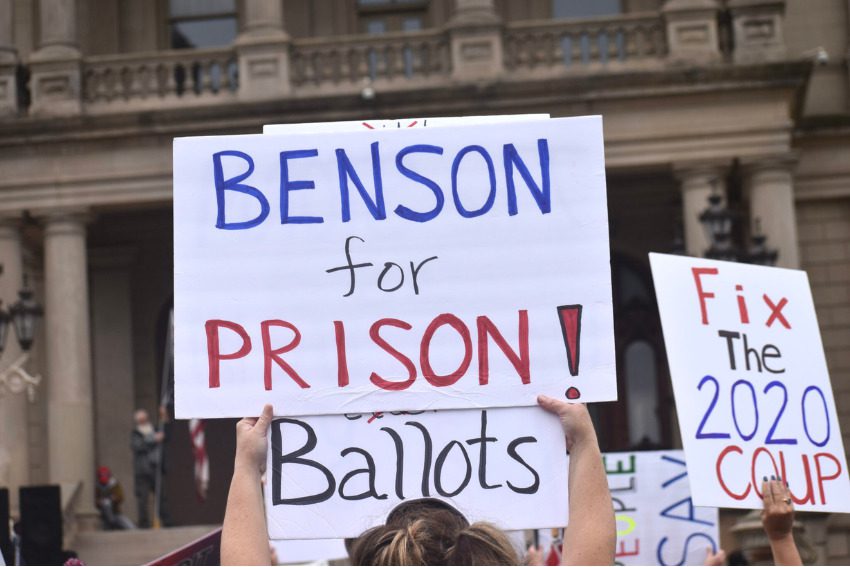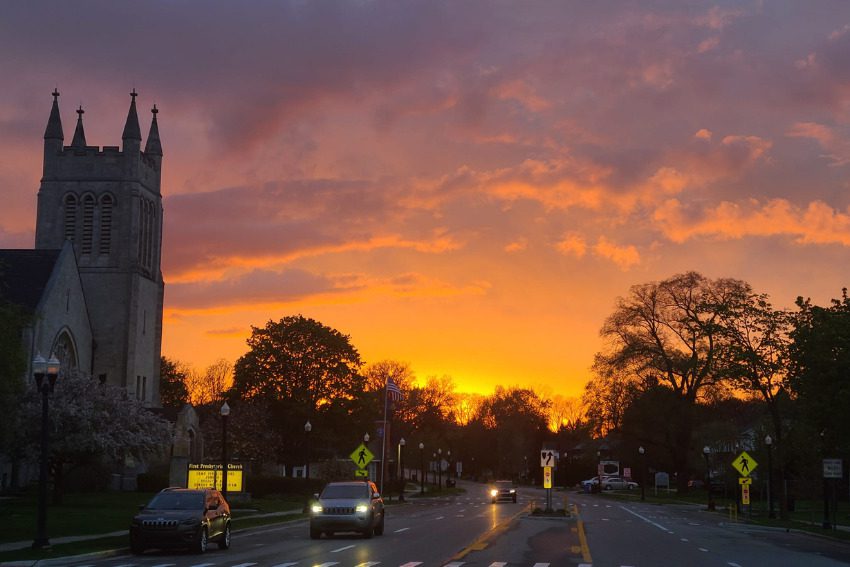
Laina G. Stebbins/Michigan Advance
BY JON KING, MICHIGAN ADVANCE
Threats targeting election officials have been seeing an alarming rise in recent years, with indications that it might be getting worse heading into the November election.
According to the latest monthly update from the Bridging Divides Initiative’s (BDI) Threats and Harassment Dataset, reported events involving threats and harassment targeting local public officials in the U.S. more than doubled in July.
BDI, a non-partisan research initiative based at Princeton University, reports that at least 70 events were recorded for the month, up from just over 30 in June. More than a third of those (36%) were death threats.
As noted in a press release, the spike came amid the heightened political tensions that followed the deadly July 13 shooting at former President Trump’s campaign rally in Pennsylvania, which resulted in threats against local officials there, as well as harassment of local officials by neo-Nazis in Tennessee.
“The rise in threats and harassment is unacceptable,” says BDI Executive Director Shannon Hiller. “While the vast majority of Americans have joined to reject calls for political violence, the data demonstrates that more needs to be done to protect civic space.”
One of the groups assisting the Bridging Divides Initiative is the Brennan Center for Justice, which noted last month that the intimidation of election workers and voters increasingly involved the use of firearms, typically displayed as an intimidation tactic, such as when armed protestors appeared at the home of Michigan Secretary of State Jocelyn Benson, accusing her of election fraud.
When asked earlier this week by the Michigan Advance about the report, Benson said there was no doubt that threats were on the rise and it was clear what the ultimate goal of those threats was.
“The noise is designed to create a sense of chaos and confusion and fear and disengagement,” she said after an event in Dearborn Heights. “It’s, I believe, intentionally designed to cause … all of us to check out and throw up our hands and say, ‘I don’t know what to believe, so I’m just walking away from all of it.’ Our job as election administrators, as leaders in the state, is to try to change that, to come through the noise and help people see the truth, which is that they have enormous power not just to decide the future of our country and our state, uh, but their own community, as well.”
The Brennan Center notes that as threats and intimidation directed at election officials have risen “meteorically” in recent years, and the risk of voter intimidation remains high, more states have recognized the urgency of keeping guns away from elections.
In Michigan, a pair of bills are awaiting final House passage that would make it illegal to possess a firearm within 100 feet of polling places, drop boxes, early voting sites and absentee ballot counting boards.
State Rep. Penelope Tsernoglou (D-East Lansing) sponsored the main bill in the package, House Bill 4127, which already won preliminary approval in both the House and Senate. Tsernoglou is confident both bills will get final approval before the Legislature adjourns in December.
“Being that we don’t want firearms at polls or counting boards is very reasonable and very much needed in the spirit of promoting democracy — allowing people to cast their votes without fear of intimidation,” she told the Michigan Advance’s partner, Stateline.
Nonetheless, the threat level remains high heading into November, according to BDI.
There have been over 320 threat and harassment events reported across more than 40 states and the District of Columbia so far this year. In fact, compared to the first seven months of 2023, threat events are up 30%, and an astounding 87% compared to the same time period in 2022.
Officials say the data indicates that threats and harassment are becoming increasingly normalized at the “hyperlocal level,” described as being specific local government votes, policies, and regulations that are beyond national politics.
Analysis of the updated data reveals that threats and harassment motivated by hyperlocal issues are on the rise, targeting local elected or appointed government officials in particular. Hyperlocal incidents accounted for the majority of events recorded in July.
“When a candidate for president of one of the two major parties spends every waking moment claiming that election workers are out to get him, it is no wonder that some of his supporters make threats like these,” said Ingham County Clerk Barb Byrum.
READ MORE: Local election workers fear threats to their safety as November nears. One group is trying to help.
This coverage is part of US Democracy Day, a nationwide collaborative on Sept. 15, the International Day of Democracy, in which news organizations cover how democracy works and the threats it faces.
It was republished from Michigan Advance pursuant to a Creative Commons license.

Why people are so concerned about Trump picking RFK Jr. to lead US public health
Trump’s pick for health secretary wants to increase access to raw milk, remove fluoride from drinking water, and has said that vaccines cause autism...

Hate and harassment towards women spreads after Trump’s election
Over a 24-hour period following Trump’s election, there was a 4,600% increase in the usage of the phrase “your body, my choice” on X. The phrase has...

Protesters wave Nazi flags outside performance of ‘The Diary of Anne Frank’ in Howell
BY JON KING, MICHIGAN ADVANCE MICHIGAN—For at least the third time in recent months, white supremacists with Nazi flags protested in Livingston...

All the racist, hateful things said at Trump’s rally at Madison Square Garden
The rally bore glaring similarities to a Nazi rally held at an earlier iteration of Madison Square Garden in 1939. “My reaction is that it was a...

Meet the anti-abortion groups and conspiracy theorists backing Patrick William O’Grady for Michigan Supreme Court
Circuit Court Judge Patrick William O’Grady is running for a seat on Michigan’s most powerful court—and some of his biggest supporters may help shed...




